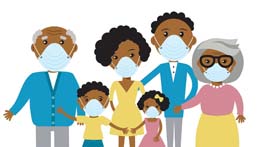Stress is difficult for everyone. However, the stress caused by the COVID-19 pandemic can be especially tough on children. They are experiencing numerous and frequent changes in their routines and even in suggested guidelines.
Since they take their cues from the adults around them, it’s important to be calm and reassuring for them. Do everything possible to deal with your stress in positive ways and share those techniques with your children.
Keep an eye on your kids and remember that not all of them react to stress the same way.
Watch for changes in their habits and behaviors including:
- Excessive crying or irritation in younger children.
- Return of behaviors from when they were younger such as bedwetting.
- An unusual amount of worry or sadness.
- Changes in eating or sleeping habits.
- Increased irritability and “acting out.”
- Poor performance at school.
- Difficulty with attention and concentration.
- Trouble completing tasks and being more disorganized than usual.
- Avoidance of activities they ordinarily enjoy.
- Increase in unexplained aches and pains or increased minor illnesses.
- Use of alcohol, tobacco or other drugs.
Ways to support your child:
- Talk honestly and age-appropriately to children about the pandemic.
- Keep regular routines even though they may be different.
- Answer your children’s questions and share facts about COVID-19 in an age-appropriate fashion.
- Limit children’s exposure to newscasts and social media as they are often frightened by things they do not understand.
- Let children know that it is not unusual to be upset and reassure them that they are safe.
- Tell them that increased stress during the pandemic is common and can cause strong feelings.
- Tell them how you deal with your own stress so that they can learn coping skills from you.
- Spend time with your children. Your guidance, time and attention are what they need most.
- Share family meals to stay in touch with your children.
- Do everything possible to provide an environment in which they feel safe.
- Play games, watch movies, listen to music and have fun with your children.
Helpful resources for additional support:
- Centers for Disease Control and Prevention (CDC) Resources on Mental Health and Coping, including People Helping Children
- Substance Abuse and Mental Health Services Administration – Coping with Stress During Infectious Disease Outbreaks
- How to Help Someone with Anxiety or Depression During COVID-19
- How to Support a Loved One Going Through a Tough Time During COVID-19
- Resilience: Build Skills to Endure Hardship
- The PEAR Institute: COVID -19 Resources
Sources: https://www.bgca.org/news-stories/2020/, www.cdc.gov


